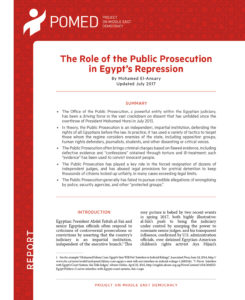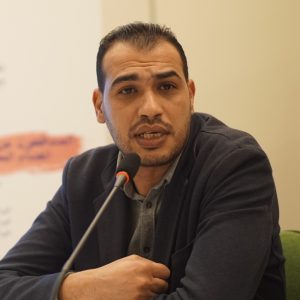Updated July 2017
In an updated POMED report, The Role of the Public Prosecution in Egypt’s Repression, and a new issue of the report in Arabic, Egyptian lawyer and legal researcher Mohamed El-Ansary closely examines the central role of the Office of the Public Prosecution in the repression of dissent in Egypt. El-Ansary describes the history of the Public Prosecution, the selection process for Public Prosecutor and his staff, and the powers, responsibilities, and practices of the office, with an emphasis on the various tactics and strategies employed by the Public Prosecution to target Egyptian citizens perceived to be enemies or even critics of the current regime.
SUMMARY
 The Office of the Public Prosecution, a powerful entity within the Egyptian judiciary, has been a driving force in the vast crackdown on dissent that has unfolded since the overthrow of President Mohamed Morsi in July 2013.
The Office of the Public Prosecution, a powerful entity within the Egyptian judiciary, has been a driving force in the vast crackdown on dissent that has unfolded since the overthrow of President Mohamed Morsi in July 2013.- In theory, the Public Prosecution is an independent, impartial institution, defending the rights of all Egyptians before the law. In practice, it has used a variety of tactics to target those whom the regime considers enemies of the state, including opposition groups, human rights defenders, journalists, students, and other dissenting or critical voices.
- The Public Prosecution often brings criminal charges based on flawed evidence, including defective evidence and “confessions” obtained through torture and ill-treatment; such “evidence” has been used to convict innocent people.
- The Public Prosecution has played a key role in the forced resignation of dozens of independent judges, and has abused legal provisions for pretrial detention to keep thousands of citizens locked up unfairly, in many cases exceeding legal limits.
- The Public Prosecution generally has failed to pursue credible allegations of wrongdoing by police, security agencies, and other “protected groups.”
The full text of the report in English is available here.



